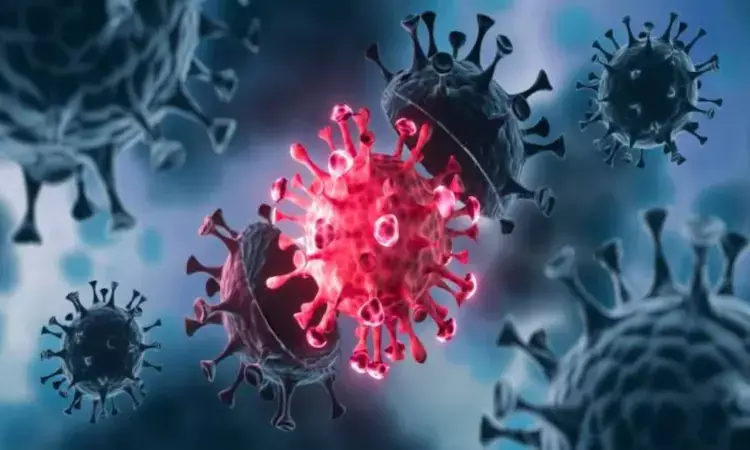- Home
- Medical news & Guidelines
- Anesthesiology
- Cardiology and CTVS
- Critical Care
- Dentistry
- Dermatology
- Diabetes and Endocrinology
- ENT
- Gastroenterology
- Medicine
- Nephrology
- Neurology
- Obstretics-Gynaecology
- Oncology
- Ophthalmology
- Orthopaedics
- Pediatrics-Neonatology
- Psychiatry
- Pulmonology
- Radiology
- Surgery
- Urology
- Laboratory Medicine
- Diet
- Nursing
- Paramedical
- Physiotherapy
- Health news
- Fact Check
- Bone Health Fact Check
- Brain Health Fact Check
- Cancer Related Fact Check
- Child Care Fact Check
- Dental and oral health fact check
- Diabetes and metabolic health fact check
- Diet and Nutrition Fact Check
- Eye and ENT Care Fact Check
- Fitness fact check
- Gut health fact check
- Heart health fact check
- Kidney health fact check
- Medical education fact check
- Men's health fact check
- Respiratory fact check
- Skin and hair care fact check
- Vaccine and Immunization fact check
- Women's health fact check
- AYUSH
- State News
- Andaman and Nicobar Islands
- Andhra Pradesh
- Arunachal Pradesh
- Assam
- Bihar
- Chandigarh
- Chattisgarh
- Dadra and Nagar Haveli
- Daman and Diu
- Delhi
- Goa
- Gujarat
- Haryana
- Himachal Pradesh
- Jammu & Kashmir
- Jharkhand
- Karnataka
- Kerala
- Ladakh
- Lakshadweep
- Madhya Pradesh
- Maharashtra
- Manipur
- Meghalaya
- Mizoram
- Nagaland
- Odisha
- Puducherry
- Punjab
- Rajasthan
- Sikkim
- Tamil Nadu
- Telangana
- Tripura
- Uttar Pradesh
- Uttrakhand
- West Bengal
- Medical Education
- Industry
People with blood group A more vulnerable to infection with novel coronavirus

USA: In a recent study published inBlood, a group of researchers led by Sean R. Stowell, MD, PhD, of Harvard Medical School, describe their laboratory experiments demonstrating SARS-CoV-2. This virus causes COVID-19 and preferentially infects blood group A cells, providing a direct link between this blood group and a higher infection rate with the virus.
“We show that the part of the SARS-CoV-2 spike protein that’s key to enabling the virus to invade cells displays an affinity for blood group A cells, and the virus, in turn, also shows a preferential ability to infect blood group A cells,” said Dr. Stowell.
Ask the average American their blood type, and you will likely receive a blank look. For most people, blood type only becomes an issue if they need a blood transfusion. Beginning in the early days of the COVID-19 pandemic, however, results from previous work published in Blood Advances suggested that people with blood group A (about a third of the US population) seemed more vulnerable to infection with the novel coronavirus. In contrast, those with blood group O (about 38% of the population) seemed less susceptible. Until now, however, no study had identified a “smoking gun” – a mechanism that might explain this apparent risk imbalance.
In the lab, Dr, Stowell and colleagues found that the addition of a protein that inhibited SARS-CoV-2 from recognizing certain blood group antigens (substances that cause an immune response in the body) blocked the virus’ preference for infecting blood group A cells, but had no effect on blood group O cells, he explained. Adding a different protein that didn’t block the recognition of blood group antigens had no infection-inhibiting effects on either A or O cells.
“Blood group A cells were more likely to be infected with SARS-CoV-2 when compared with blood group O cells,” Dr. Stowell said. Further experiments showed that the Omicron strain of SARS-CoV-2 had an even stronger preference for infecting blood group A cells than the original virus.
While the findings provide one mechanism for how blood group A may directly influence the risk of infection with SARS-CoV-2, Dr. Stowell cautioned that the findings do not mean people with blood group O do not need to take precautions against SARS-CoV-2 infection.
“Among a group of several thousand people, some studies suggest that those with blood group A maybe 20% more likely to be infected after exposure to SARS-CoV-2 than those with blood group O. But people with blood group O can still contract the virus and may transmit it to others,” he said. “Factors such as age and chronic conditions like heart disease rank higher than blood type in determining individuals’ risk for severe SARS-CoV-2 infection.”
“Blood group is one of many variables that influence one’s likelihood of becoming infected following exposure to SARS-CoV-2,” he said. “Regardless of their blood group, individuals should be fully vaccinated against COVID-19 and should continue to take other preventive measures appropriate to their risk level.”
Future studies will be needed to uncover features of the virus that are ultimately responsible for engaging blood group A in addition to the extent to which this preference is preserved as new variants SARS-CoV-2 variants emerge.
Dr Kamal Kant Kohli-MBBS, DTCD- a chest specialist with more than 30 years of practice and a flair for writing clinical articles, Dr Kamal Kant Kohli joined Medical Dialogues as a Chief Editor of Medical News. Besides writing articles, as an editor, he proofreads and verifies all the medical content published on Medical Dialogues including those coming from journals, studies,medical conferences,guidelines etc. Email: drkohli@medicaldialogues.in. Contact no. 011-43720751


